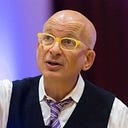Member-only story
Hubris is the opposite of trust
We can trust the process, but we can’t be sure of the outcome
Trust is a form of belief. It doesn’t require proof, in fact, if there’s proof, there’s no reason for it.
And one form of proof is the make-believe attitude of certainty. The hubris of over-confidence. The statement, through word or action, that there’s no doubt in our minds that it’s going to be precisely the way we said it would.
We see this in sports all the time. Where an athlete guarantees an outcome. Of course, in most finite games, one side is going to lose, so guarantees are fairly flimsy.
What’s the alternative?
We don’t have to be sure. We can simply trust ourselves. We can trust the practice. We can acknowledge that future outcomes are uncertain, but remind ourselves that our process is all we’ve got.
We’re not dismissing the outcome. In fact, we’re committing to the best method we have to achieve the outcome we’d like to contribute.
The goal is to be on the hook. Not because we have the hubris to claim that it’s always going to work. No, we seek to be on the hook because we have the generosity to show up even if we can’t be sure.
[What does your practice look like? Would it be more powerful if you didn’t have to pretend there was a guarantee?]
